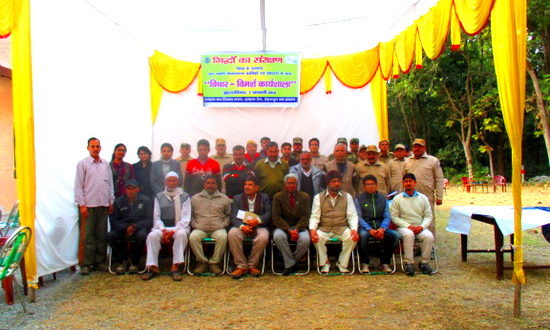Livestock Carcass Disposal Workers and Contractors Attend Workshop on Vulture Conservation
Dehradun, January 7, 2016: Wildlife Trust of India (WTI) in collaboration with the Uttarakhand Forest Department, Bombay Natural History Society (BNHS) and Royal Society for the Protection of Birds, UK, organised a consultation workshop with the dead livestock disposal workers and contractors on vulture conservation on January 7, 2016. The half day workshop was conducted at the Forest Rest House, Jhajhra Range of Dehradun Forest Division.
The workshop was organised keeping in mind that the Haryana Forest Department and BNHS are planning to release captive bred and reared vultures in the Morni Hills for the first time after almost 90 % decline of vulture population in India. Since the Doon Valley is almost 50-80 kms away from Morni Hills, the released vultures are expected to fly in to the Doon Valley for feeding on livestock carcasses.
It, therefore, becomes important to ensure that such dumping sites are in a safe zone and free from electrocution hazards. Further, it is also important to ensure that the carcasses are free from Diclofenac contamination.
Those present during the workshop included Gulvir Singh, SDO, Dehradun Division; Prof BC Choudhury, Senior Advisor, WTI; and a team of vulture researchers from the Pinjore Vulture Conservation Centre of the BNHS.
The consultation workshop deliberated with the livestock carcass disposal workers and contractors of Doon Valley so as to ensure a safe wintering location for the endangered vultures. The livestock disposal contractors and workers supported the conservation initiatives and assured total support to the Forest Department and the vulture research community. Their request through this workshop to the state government was largely based on allocation of permanent and safe livestock carcass dumping ground, as currently they face objection from villagers and others for dumping carcasses near residential areas.
They vociferously supported their participation and contribution if the state government is planning to create some Vulture Safe Zones (VSZs). They also agreed to provide carcass samples to assess whether they are free from Diclofenac. The carcass disposal contractors also suggested continuation of such consultation meeting at panchayat level so that the vulture conservation issues and requirements are understood at the ground level.
More than 40 participants from the frontline staff of the Forest Department, dead livestock carcass disposal contractors, BNHS researchers, WTI officials, Doon University researchers and media persons participated in the workshop. During the workshop it was decided that consultation meetings at panchayat level would also be conducted in the near future.










